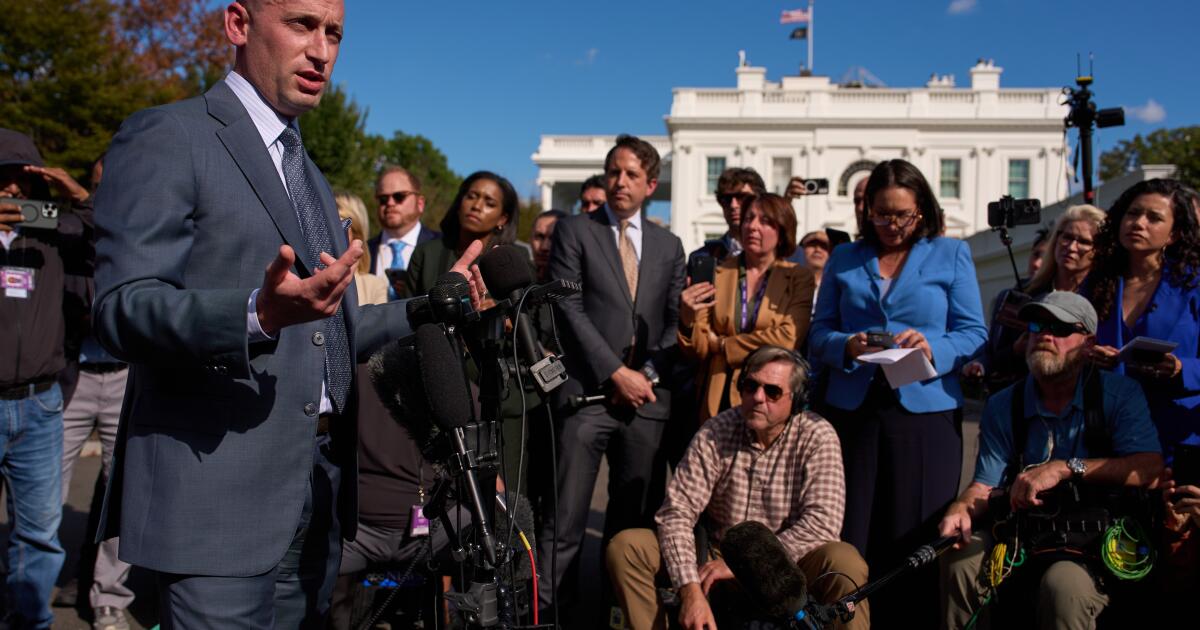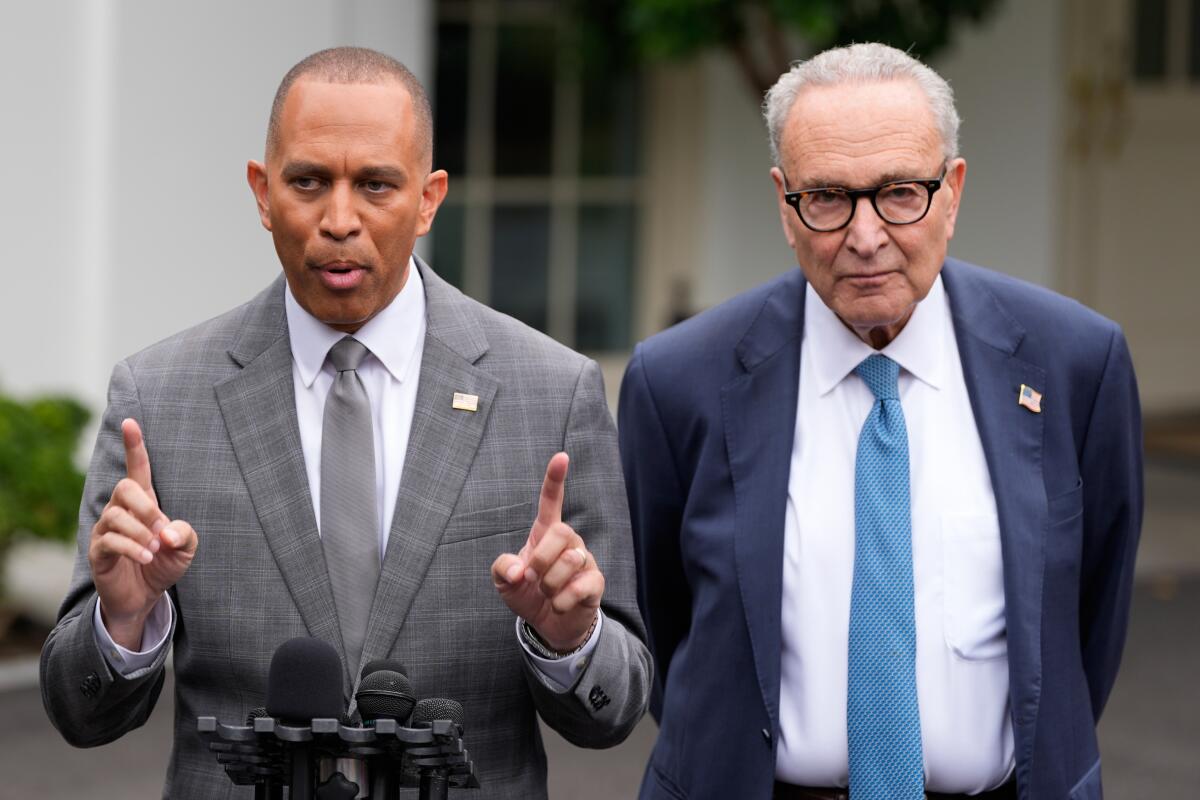Trump advisors amp up extreme rhetoric against Democrats during government shutdown, immigration raids
WASHINGTON — President Trump rocked American politics at the outset of his first campaign when he first labeled his rivals as enemies of the American people. But the rhetoric of his top confidantes has grown more extreme in recent days.
Stephen Miller, the president’s deputy chief of staff, declared over the weekend that “a large and growing movement of leftwing terrorism in this country” is fueling a historic national schism, “shielded by far-left Democrat judges, prosecutors and attorneys general.”
“The only remedy,” Miller said, “is to use legitimate state power to dismantle terrorism and terror networks.”
It was a maxim from an unelected presidential advisor who is already unleashing the federal government in unprecedented ways, overseeing the federalization of police forces and a sweeping deportation campaign challenging basic tenets of civil liberty.
Miller’s rhetoric comes amid a federal crackdown on Portland, Ore., where he says the president has unchecked authority to protect federal lives and property — and as another controversial Trump advisor harnesses an ongoing government shutdown as pretext for the mass firing of federal workers.
Russ Vought, the president’s director of the Office of Management and Budget, plays the grim reaper in an AI video shared by the president, featuring him roving Washington for bureaucrats to cut from the deep state during the shutdown.
His goal, Trump has said, is to specifically target Democrats.
As of Monday afternoon, it was unclear exactly how many federal workers or what federal agencies would be targeted.
“We don’t want to see people laid off, but unfortunately, if this shutdown continues layoffs are going to be an unfortunate consequence of that,” White House Press Secretary Karoline Levitt said during a news briefing.
‘A nation of Constitutional law’
Karin Immergut, a federal judge appointed by Trump, said this weekend that the administration’s justification for deploying California National Guard troops in Portland was “simply untethered to the facts.”
“This country has a longstanding and foundational tradition of resistance to government overreach, especially in the form of military intrusion into civil affairs,” Immergut wrote, chiding the Trump administration for attempting to circumvent a prior order from her against a federal deployment to the city.
“This historical tradition boils down to a simple proposition,” she added: “This is a nation of Constitutional law, not martial law.”
The administration is expected to appeal the judge’s decision, Leavitt said, while calling the judge’s ruling “untethered in reality and in the law.”
“We’re very confident in the president’s legal authority to do this, and we are very confident we will win on the merits of the law,” Leavitt said.
If the courts were to side with the administration, Leavitt said local leaders — most of whom are Democrats — should not be concerned about the possibility of long-term plans to have their cities occupied by the military.
“Why should they be concerned about the federal government offering help to make their cities a safer place?” Leavitt said. “They should be concerned about the fact that people in their cities right now are being gunned down every single night and the president, all he is trying to do, is fix it.”
Moments later, Trump told reporters in the Oval Office that though he does not believe it is necessary yet, he would be willing to invoke the Insurrection Act “if courts were holding us up or governors or mayors were holding us up.”
“Sure, I’d do that,” Trump said. “We have to make sure that our cities are safe.”
The Insurrection Act gives the president sweeping emergency power to deploy military forces within the United States if the president deems it is needed to quell civil unrest. The last time this occurred was in 1992, when California Gov. Pete Wilson asked President George H.W. Bush to send federal troops to help stop the Los Angeles riots that occurred after police officers were acquitted in the beating of Rodney King.
Subsequent posts from Miller on social media over the weekend escalated the stakes to existential heights, accusing Democrats of allying themselves with “domestic terrorists” seeking to overturn the will of the people reflected in Trump’s election win last year.
On Monday, in an interview with CNN, Miller suggested that the administration would continue working to sidestep Immergut’s orders.
“The administration will abide by the ruling insofar as it affects the covered parties,” he said, “but there are also many options the president has to deploy federal resources under the U.S. military to Portland.”
Other Republicans have used similar rhetoric since the slaying of Charlie Kirk, a conservative youth activist, in Utah last month.
Rep. Derrick Van Orden (R-Wis.) wrote that posts from California Gov. Gavin Newsom’s office have reached “the threshold of domestic terrorism,” after the Democratic governor referred to Miller on social media as a fascist. And Rep. Randy Fine (R-Fla.) said Monday that Democrats demanding an extension of healthcare benefits as a condition for reopening the government were equivalent to terrorists.
“I don’t negotiate with terrorists,” Fine told Newsmax, “and what we’ve learned in whether it’s dealing with Muslim terrorists or Democrats, you’ve gotta stand and you’ve gotta do the right thing.”
Investigating donor networks
Republicans’ keenness to label Democrats as terrorists comes two weeks after Trump signed an executive order declaring a left-wing antifascist movement, known as antifa, as a “domestic terrorist organization” — a designation that does not exist under U.S. law.
The order, which opened a new front in Trump’s battle against his political foes, also threatened to investigate and prosecute individuals who funded “any and all illegal operations — especially those involving terrorist actions — conducted by antifa or any person claiming to act on behalf of antifa.”
Leavitt told reporters Monday that the administration is “aggressively” looking into who is financially backing these operations.
Trump has floated the possibility of going after people such as George Soros, a billionaire who has supported many left-leaning causes around the world.
“If you look at Soros, he is at the top of everything,” Trump said during an Oval Office appearance last month.
The White House has not yet made public any details about a formal investigation into donors, but Leavitt said the administration’s efforts are underway.
“We will continue to get to the bottom of who is funding these organizations and this organized anarchy against our country and our government,” Leavitt said. “We are committed to uncovering it.”

